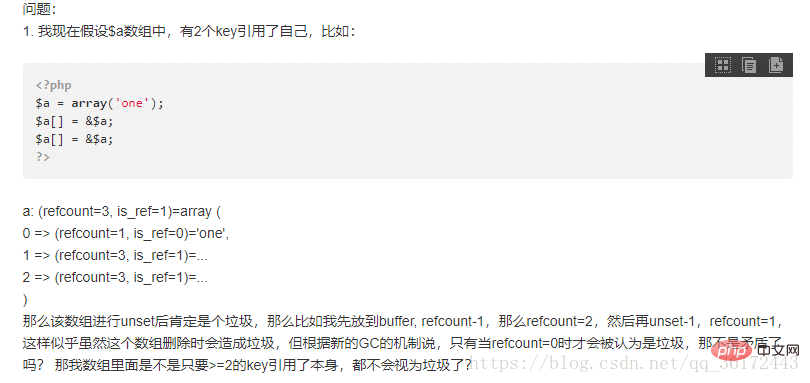Chat about php7 garbage collection mechanism
PHP7The column introduces the garbage collection mechanism

Recommended (free): PHP7
Article directory
- Zval structure
- Circular reference Memory leak caused
- Object and array recycling process
- Principle of garbage collection
- Example
When understanding our php GC, I think it is necessary for me to introduce the underlying implementation of our php variables.
The structure of zval
// php 变量对于的c结构体
struct _zval_struct {
zend_value value;
union {
……
} u1;
union {
……
} u2;
};Since it mainly talks about garbage collection, here is a brief introduction to the functions of the u1 u2 unionu1 The structure is relatively complex. I think it is mainly used to identify variable typesu2 Most of them are auxiliary fields, the implementation of internal functions of variables, improving cache friendliness, etc.
Next is us The protagonist
zend_value It is also a union embedded in the structure
typedef union _zend_value {
zend_long lval;//整形
double dval;//浮点型
zend_refcounted *counted;//获取不同类型的gc头部
zend_string *str;//string字符串
zend_array *arr;//数组
zend_object *obj;//对象
zend_resource *res;//资源
zend_reference *ref;//是否是引用类型
// 忽略下面的结构,与我们讨论无关
zend_ast_ref *ast;
zval *zv;
void *ptr;
zend_class_entry *ce;
zend_function *func;
struct {
ZEND_ENDIAN_LOHI(
uint32_t w1,
uint32_t w2)
} ww;
} zend_value;The reference count is recorded in the value of zvalzend_refcounted *countedThis type, our garbage collection mechanism is also based on this.
typedef struct _zend_refcounted_h {
uint32_t refcount; /* reference counter 32-bit */
union {
struct {
ZEND_ENDIAN_LOHI_3(
zend_uchar type,
zend_uchar flags, /* used for strings & objects */
uint16_t gc_info) /* keeps GC root number (or 0) and color */
} v;
uint32_t type_info;
} u;
} zend_refcounted_h;The definition of all complex types starts with the zend_refcounted_h structure. In addition to reference counting, this structure also has GC-related structures. Therefore, when doing GC recycling , GC does not need to care about the specific type, all of it can be processed as a zend_refcounted* structure.
#Automatic recycling of variables
In PHP except array and object type variables, most of the rest are automatically recycled
PHP The recycling of ordinary variables is related to the number of references to the variable.
Official example
$a = 1;
$b = $a;
xdebug_debug_zval('a');
$a =10;
xdebug_debug_zval('a');
unset($a);
xdebug_debug_zval('a');Result
a: (refcount=2, is_ref=0),int 1 a: (refcount=1, is_ref=0),int 10 a: no such symbol
You can see that when $a =10 it involves php’s COW (copy-on- write) mechanism, $b will copy the original $a, canceling the reference relationship between them, so the number of references (refcount) of a is reduced to 1.
Then the number of references to a becomes 0 after we uset($a). This will be considered a garbage variable and free up space.
Give an example
$a = [1]; $a[1] = &$a; unset($a);
The type of $a before unset($a) is a reference type
a: (refcount=2, is_ref=1), array (size=2) 0 => (refcount=1, is_ref=0),int 1 1 => (refcount=2, is_ref=1), &array<p><img src="/static/imghw/default1.png" data-src="https://img.php.cn/upload/article/000/000/052/163e22c0271ab639b6a5080b1ccd0d58-0.jpg" class="lazy" alt=""></p><p>unset($ a) After that, it becomes like this</p><p><img src="/static/imghw/default1.png" data-src="https://img.php.cn/upload/article/000/000/052/163e22c0271ab639b6a5080b1ccd0d58-1.jpg" class="lazy" alt=""></p><p>At this time, when we <code>unset</code> operate, the refcount changes from 2 to 1 because there is an internal reference pointing to $a , so the space it occupies externally will not be destroyed. </p><p>Then our external reference has been interrupted and we cannot use it. It becomes an "orphan", which is called a wild pointer in the C language. In php it's called a circular reference. Memory leak. If you want to destroy the variable, you can only wait for the php script to end. </p><p><strong>Memory leaks caused by circular references</strong></p><p>In order to clean up this garbage, two criteria are introduced</p>
- If the reference count is reduced to zero, The variable container will be cleared (free) and is not garbage
- If the reference count of a zval is still greater than 0 after being reduced, then it will enter the garbage cycle. Secondly, during a garbage cycle, find out which parts are garbage by checking whether the reference count is reduced by 1 and checking which variable containers have zero references.
Circular references basically only appear in arrays and objects. The object is because it itself is a reference
The recycling process of object and array
Garbage collection in php7 consists of two parts, one is the garbage collector and the other is the garbage collection algorithm.
The garbage collector collects the elements just mentioned that may be garbage into the recycling pool, that is, the variable zend_refcount>0 is placed in the recycling pool. When the value of the recycling pool reaches a certain amount, it will be traversed uniformly. Perform simulated deletion. If zend_refcount=0, it is considered garbage and deleted directly.
Traverse every variable in the recycling pool, and then traverse each member based on each variable. If the members are still nested, continue traversing. Then set the simulated refcount of all members to -1. If the reference count of the external variable is 0 at this time. Then it can be considered garbage, clearly. If it is greater than 0, then the number of references is restored and taken out from the garbage collection pool.
The principle of garbage collection
If your variable is not garbage, then after the references of all its member variables are reduced by one, the reference of the total variable will definitely not be 0.
Example
It’s rather hard to say, so why not give an example. When I first browsed sf.gg, I saw a question about GC, and I answered it. About the GC garbage collection mechanism
The topic is as follows
//我的回答 1、只要zval.value的refcount减一,然后缺其refcount的值不为0那么它就可能是垃圾,进入垃圾周期。 2、进入垃圾池遍历所有成员,包括其嵌套的成员,都对其做 refcount-1的操作,看外部的引用是否为0。 那么对于 题主的问题来说, 首先,你要想$a为垃圾,一定要先对 unset($a)操作,那么此时 $a的 refcount = 2 对于$a[0] refcount-1 不影响外部的$a, $a[1] refcount-1 ,此时 $a的 refount=1 $a[2] refcount-1 ,此时 $a 的 refount=0 模拟减结束,那么此变量被当成垃圾回收。
更多编程相关知识,请访问:编程教学!!
The above is the detailed content of Chat about php7 garbage collection mechanism. For more information, please follow other related articles on the PHP Chinese website!

Hot AI Tools

Undresser.AI Undress
AI-powered app for creating realistic nude photos

AI Clothes Remover
Online AI tool for removing clothes from photos.

Undress AI Tool
Undress images for free

Clothoff.io
AI clothes remover

Video Face Swap
Swap faces in any video effortlessly with our completely free AI face swap tool!

Hot Article

Hot Tools

Notepad++7.3.1
Easy-to-use and free code editor

SublimeText3 Chinese version
Chinese version, very easy to use

Zend Studio 13.0.1
Powerful PHP integrated development environment

Dreamweaver CS6
Visual web development tools

SublimeText3 Mac version
God-level code editing software (SublimeText3)

Hot Topics
 1386
1386
 52
52
 How to install mongo extension in php7.0
Nov 21, 2022 am 10:25 AM
How to install mongo extension in php7.0
Nov 21, 2022 am 10:25 AM
How to install the mongo extension in php7.0: 1. Create the mongodb user group and user; 2. Download the mongodb source code package and place the source code package in the "/usr/local/src/" directory; 3. Enter "src/" directory; 4. Unzip the source code package; 5. Create the mongodb file directory; 6. Copy the files to the "mongodb/" directory; 7. Create the mongodb configuration file and modify the configuration.
 How to solve the problem when php7 detects that the tcp port is not working
Mar 22, 2023 am 09:30 AM
How to solve the problem when php7 detects that the tcp port is not working
Mar 22, 2023 am 09:30 AM
In php5, we can use the fsockopen() function to detect the TCP port. This function can be used to open a network connection and perform some network communication. But in php7, the fsockopen() function may encounter some problems, such as being unable to open the port, unable to connect to the server, etc. In order to solve this problem, we can use the socket_create() function and socket_connect() function to detect the TCP port.
 What should I do if the plug-in is installed in php7.0 but it still shows that it is not installed?
Apr 02, 2024 pm 07:39 PM
What should I do if the plug-in is installed in php7.0 but it still shows that it is not installed?
Apr 02, 2024 pm 07:39 PM
To resolve the plugin not showing installed issue in PHP 7.0: Check the plugin configuration and enable the plugin. Restart PHP to apply configuration changes. Check the plugin file permissions to make sure they are correct. Install missing dependencies to ensure the plugin functions properly. If all other steps fail, rebuild PHP. Other possible causes include incompatible plugin versions, loading the wrong version, or PHP configuration issues.
 An article to talk about the garbage collection mechanism in php
Aug 26, 2022 am 10:48 AM
An article to talk about the garbage collection mechanism in php
Aug 26, 2022 am 10:48 AM
This article will give you an in-depth understanding of the garbage collection mechanism in PHP. I hope it will be helpful to you!
 PHP Server Environment FAQ Guide: Quickly Solve Common Problems
Apr 09, 2024 pm 01:33 PM
PHP Server Environment FAQ Guide: Quickly Solve Common Problems
Apr 09, 2024 pm 01:33 PM
Common solutions for PHP server environments include ensuring that the correct PHP version is installed and that relevant files have been copied to the module directory. Disable SELinux temporarily or permanently. Check and configure PHP.ini to ensure that necessary extensions have been added and set up correctly. Start or restart the PHP-FPM service. Check the DNS settings for resolution issues.
 How to install and deploy php7.0
Nov 30, 2022 am 09:56 AM
How to install and deploy php7.0
Nov 30, 2022 am 09:56 AM
How to install and deploy php7.0: 1. Go to the PHP official website to download the installation version corresponding to the local system; 2. Extract the downloaded zip file to the specified directory; 3. Open the command line window and go to the "E:\php7" directory Just run the "php -v" command.
 How to automatically set permissions of unixsocket after system restart?
Mar 31, 2025 pm 11:54 PM
How to automatically set permissions of unixsocket after system restart?
Mar 31, 2025 pm 11:54 PM
How to automatically set the permissions of unixsocket after the system restarts. Every time the system restarts, we need to execute the following command to modify the permissions of unixsocket: sudo...
 Decrypting the memory management and garbage collection mechanism of Go language
Nov 30, 2023 am 09:17 AM
Decrypting the memory management and garbage collection mechanism of Go language
Nov 30, 2023 am 09:17 AM
Go language is an efficient, safe, and concurrent programming language. The design of memory management and garbage collection mechanism is also its unique feature. This article will decrypt the memory management and garbage collection mechanism of Go language in depth. 1. Memory management In the Go language, memory management includes two aspects: memory allocation and memory release. 1.1 Memory allocation In the Go language, we allocate memory through the built-in functions new and make. Among them, new returns a pointer to the newly allocated zero value, while make returns a specified type and its length.




